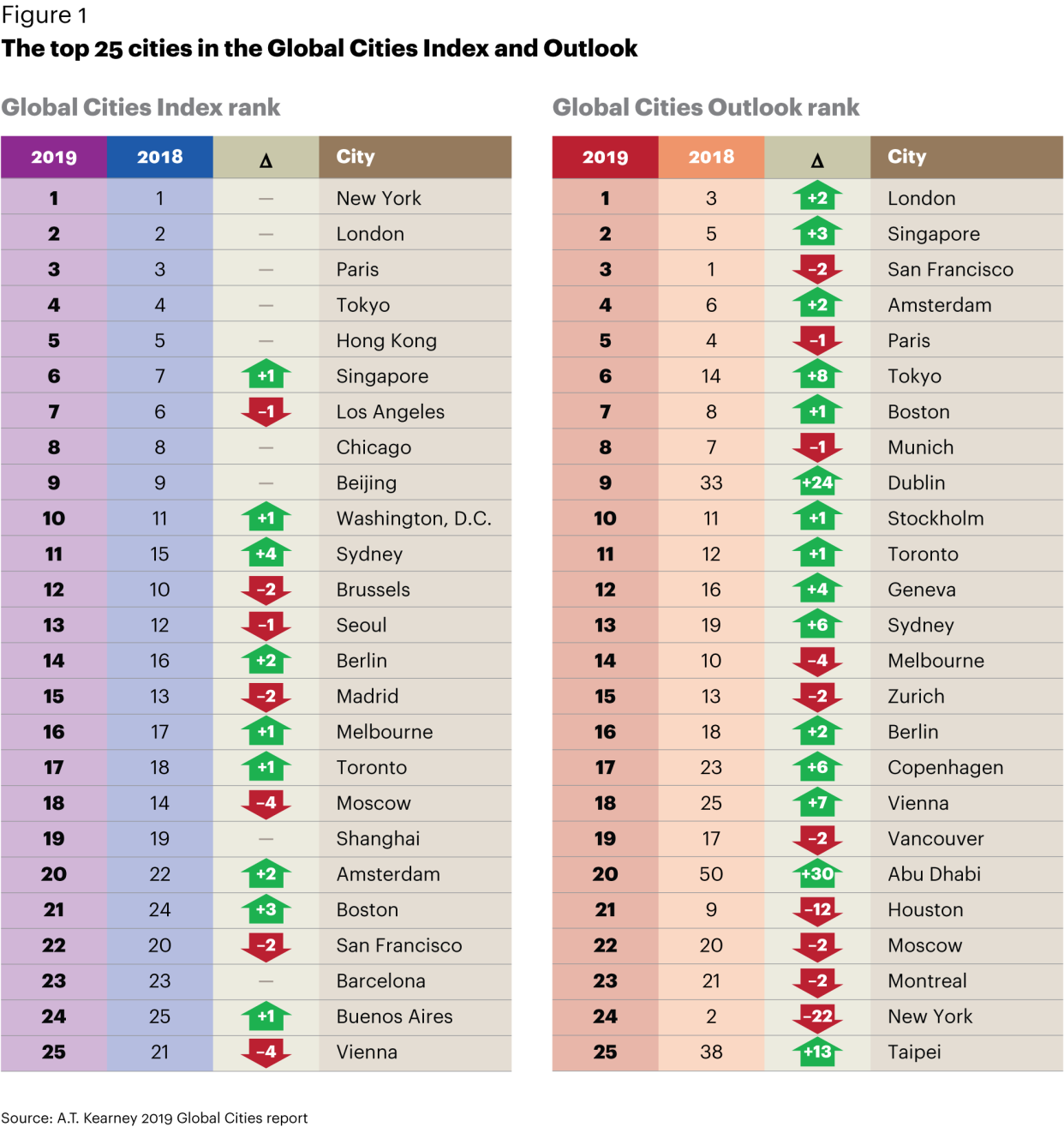Here's how Canadian cities rank globally in competitiveness

This year the annual Global Cities Report, released by A.T. Kearney, analyzed 130 cities, scoping out the current performance (Index) and future potential (Outlook) of cities in areas like business activity, human capital and information exchange. New York, London and Paris continue to hold the top three places, and Toronto was the highest ranked Canadian city in 17th position, up one spot from 2018.
Much of the jump for cities assessed was seen in relation to improvements made with information exchange and human capital. The Index scores for Singapore, Los Angeles, Chicago, Beijing, and Washington D.C. improved significantly this year. Other Canadian cities like Vancouver and Montreal are on the radar, but all fail in comparison to the leaders—none even crack close to the top 10.
Another report from the firm, this on countries poised to attract greater foreign direct investment (FDI) over the next three years, saw Canada ranked in the third spot. The United States remained the leader for the seventh consecutive year, and Germany moved into the second spot that was previously occupied by Canada. Despite the bump, the report notes investment into Canada has seen a boost with an increase of “nearly 60 per cent from last year, reversing a years-long downward trend,” this in accordance to the A.T. Kearney 2019 FDI Confidence Index.
The global management consulting firm defined foreign direct investment (FDI) as an equity investment by a company in one country in a company in a different country. The Index here ranks the most attractive markets for investments; 500 senior executives worldwide were surveyed. The United Kingdom, France, Japan, China, Italy, Australia and Singapore rounded out the top 10.
Where are the fractures in Canada?
“We must dismantle the interprovincial barriers that limit our ability to find any scale,” says business strategist Tony Chapman to Yahoo Finance Canada. “We must create hubs of excellence that attract like minded people, yet in places where they can also afford to raise their families.”
The new economy is different. “Shipping lanes are evaporating into the clouds, scale is surrendering to speed, and people can work remotely yet effortlessly collaborate with others around the world,” adds Chapman. If Canadian cities want to remain competitive “they must learn from other markets who are performing to the new economy,” he stresses.
Looking back, Chapman references how major cities were the arena where competition took place. “They offered critical mass, infrastructure, access to shipping lanes by river, sea, rail and road, and they were the magnet that attracted the entire supply chain.”
Now, there’s more chatter (and dollars) seeded into areas like AI, banking, content creation and gaming. Chapman says key drivers like education, continuous learning, research and development, and capitalization should be where Canada invests.
Chapman says cannabis is a perfect example where interprovincial barriers have limited our ability to master scale. And maybe speed is ruining scale, in the process Canada’s opportunity to make a cooperative dent and compete globally.
As noted in a previous Yahoo article, “Canada needs to step up and build out a coordinated international export and investment attraction strategy.” And this could start on the local foot in addition to nationally.
“It is disappointing to see that Canadian cities do not rank more highly on the Index,” says Brian Kingston, vice president of international and fiscal issues at the Business Council of Canada. “While Canada has a competitive advantage when it comes to attracting and retaining talent, we have work to do in a few other areas including transportation infrastructure and the ease of doing business.”


